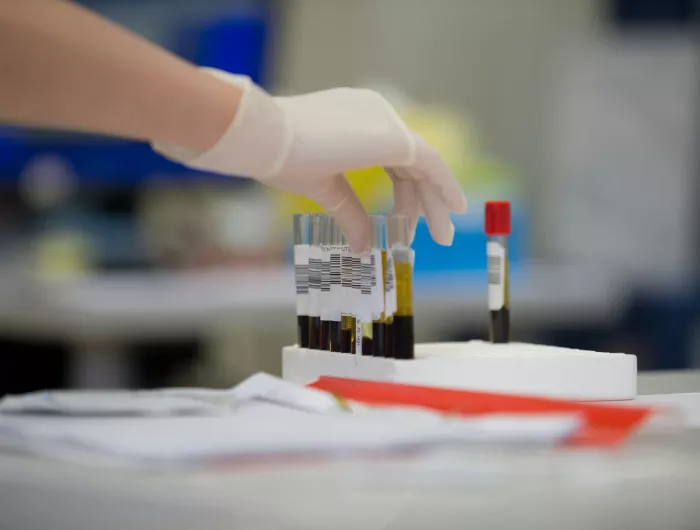FDA’s Laboratory-Developed Tests Final Rule: District Court Amicus Brief

Adrian Sulyok - unsplash.com.
CSPI filed an amicus brief in support of FDA’s Final Rule strengthening oversight over Laboratory-Developed Tests (LDTs).
In November 2024, CSPI filed an amicus brief in the Eastern District of Texas supporting the FDA’s Final Rule expanding oversight over LDTs. The Final Rule, which was issued by FDA on May 6, 2024, ensures that certain diagnostic tests developed and performed in laboratories are subject to the same regulatory oversight as similar diagnostic tests made by manufacturers.
Laboratory-Developed Tests (LDTs)
LDTs are a subset of in vitro diagnostic tests (IVDs), which are clinical tests that can detect disease, conditions, and infections. The term LDT has historically referred to an IVD test that is designed, manufactured, and used within a single laboratory, but now is also used to include such tests developed and performed by laboratories in multiple locations such as Quest or Labcorp. LDTs can be used to test for a variety of biomarkers and conditions, ranging from cholesterol levels to the presence of serious diseases and conditions, such as Alzheimer’s Disease, heart disease, and cancer.
Until recent years, LDTs were used only for a small number of patients in special clinical circumstances, and were often simple tests. Now, however, LDTs represent a $20 billion industry and comprise a majority of diagnostic tests in the US each year, with tens of thousands of complex tests being offered to millions of patients to diagnose and evaluate a wide range of conditions, from everyday illnesses to terminal cancers.
FDA’s Final Rule
Although FDA has regulated IVDs since the 1970s, most LDTs have historically not been subject to regulation as a result of FDA’s decision to use enforcement discretion concerning LDTs. However, as the risks posed by unregulated LDTs has increased, so too has FDA’s concern over them grown. In June 2023, after decades of reports, draft guidances, hearings, and meetings, FDA issued a Proposed Rule on LDTs, phasing out its practice of enforcement discretion. CSPI submitted a comment on the Proposed Rule.
On May 6, 2024, FDA issued its Final Rule, noting that LDTs are a subset of IVDs and announcing that the agency was phasing out its practice of enforcement discretion for LDTs. As such, LDTs will be subject to the same regulatory requirements as IVDs, examples of which include being subject to mandatory adverse event reporting, premarket review, and labeling requirements. In so doing, FDA clarified that LDTs meet the definition of “devices,” which it has had the authority to regulate under the Federal Food Drug & Cosmetic Act since 1976, including where the manufacturer of the test is a laboratory.
The Lawsuit
FDA’s Final Rule was quickly challenged in two lawsuits, whose lead Plaintiffs were industry groups with a vested economic interest in LDTs remaining minimally regulated (i.e., American Clinical Laboratories Association and Association for Molecular Pathology). Although the two cases were filed in different district courts, they were subsequently consolidated into a single case in the United States District Court for the Eastern District of Texas.
All of the Parties have asked the court to decide the case based on the motions for summary judgment (that is, motions arguing that the case could be decided as a matter of law because of the absence of material facts in dispute) that they all filed. Plaintiffs’ motions contend that FDA lacks the authority to regulate LDTs and that Congress instead intended for regulation to occur exclusively under the Clinical Laboratory Improvement Amendments of 1988 (CLIA), which vested the power to regulate clinical laboratories in the Center for Medicare & Medicaid Services. FDA’s motion supported its authority to issue the Final Rule.
The Parties’ motions for summary judgment have been fully briefed. Oral argument on these motions has been scheduled for February 19, 2025.
CSPI’s Amicus Brief
On November 4, 2024, CSPI filed an amicus brief in support of FDA’s Final Rule and FDA’s brief. CSPI’s brief provides a description of the relevant history concerning FDA’s regulation of LDTs (both to provide history that the Plaintiffs omitted and to correct some of their misleading contentions); discusses the longstanding regulation of IVDs and the oversight of laboratories under CLIA and other laws; and addresses the present-day circumstances necessitating the Final Rule (both the inaccuracy of many LDTs and the adverse effects to public health that will occur if FDA is not permitted to exercise its authority to regulate this subset of IVDs).
Key legal documents
- ACLA Plaintiffs’ Motion for Summary Judgment (9/3/24)
- AMP Plaintiffs’ Motion for Summary Judgment (9/27/24)
- FDA’s Motion for Summary Judgment and Opposition to Plaintiffs’ Motions (10/25/24)
- CSPI’s Amicus Brief (11/4/24)
- ACLA’s Combined Reply in Support of Its Motion and Opposition to FDA’s Motion (11/25/24)
- AMP’s Combined Reply in Support of Its Motion and Opposition to FDA’s Motion (11/25/24)
- FDA’s Combined Reply in Support of Its Motion and Opposition to ACLA and AMP’s Motions (12/23/24)

